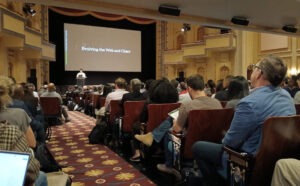This years Fedora Flock event was slated to take place in Mexico City. Then organizers hit a roadblock that made it a bridge too far.

When the folks at Fedora held their online release party for Fedora 39 back in November, the folks behind the popular Linux distribution announced that this year’s Flock to Fedora 2024 event would take place in Mexico City, which was pretty exciting since Latin American Linux users are pretty much off the radar in American locales that are primarily English speaking (I’m pointing at you ‘Murica and most-of-Canada). Many, including myself, were seeing this as an opportunity for a great Pan-American mixer for Linux and open-source advocates everywhere in the Western Hemisphere.
Alas, it turned out that evidently wasn’t meant to be. On Thursday, Justin Flory, Red Hat’s Fedora Community Architect, said in a post on Fedora Magazine that the distro’s contributor-focused conference will instead take place in Rochester, New York from August 7 to August 10. This will will make it the first Flock event to be held in the U.S. since 2017.
So, what happened since November to cause the conference to be moved from diverse and exciting Mexico City to the safe and familiar white bread city that Kodak built (no offence, Rochester)? Evidently, holding a conference in North America’s largest metropolitan area is too expensive.
“It is true that this Flock nearly went to Mexico City,” Flory wrote in the Fedora Magazine blog. “We were excited to bring Flock 2024 to LATAM. However, we ran into unexpected pricing difficulties at the last minute with our negotiated venues. In fact, the price we targeted nearly doubled when we were about to sign contracts for Mexico City. However, we found that the high price from our planned hotel was not unique. Price was also a challenge for other Mexico City hotels that met our requirements for Flock. When we faced this pricing challenge, we went back to the drawing board for our options.”
Flory said that in the same discussions that had resulted in Mexico City initially being chosen as the host city, the cities of Montreal in the mostly French speaking part of Canada and Rochester, New York had also been evaluated.
“We originally ruled out Montreal due to higher costs for international travel and venues,” he said. “The ongoing civil dispute between the Canadian and Indian governments also presented a challenge for visa sponsorship. So, we looked again at Rochester, which we had originally ruled out due to poor availability of dates. We went back directly to our venue of choice. The dates we wanted for Flock were actually available! So we quickly worked to finalize them.”
Not the First Time Fedora Flocked to Rochester
It turns out that the city of Rochester and Fedora’s Flock conference are already acquainted. Flock 2015 was also held in Rochester, which means that when the doors open on this year’s event, it will become the first city to host a Flock event twice.
According to Flory, there were good reasons why the city had been a top contender for Flock 2024 before Mexico City was picked, citing strong open source connections by way of the Rochester Institute of Technology.
“Both Open@RIT and the open source academic curriculum foster a community of open source in the academic space,” he said. “We are well-positioned to deliver an amazing Flock to Fedora experience in Rochester this year. We hope to offer a new experience for first-timers and also some surprises for our old-timers and past visitors of Flock 2015.”
Christine Hall has been a journalist since 1971. In 2001, she began writing a weekly consumer computer column and started covering Linux and FOSS in 2002 after making the switch to GNU/Linux. Follow her on Twitter: @BrideOfLinux








This is a racist, offensive comment:
“So, what happened since November to cause the conference to be moved from diverse and exciting Mexico City to the safe and familiar *white bread city* that Kodak built (no offence, Rochester)?”
I think you’re thinking white bread means white-bred or something. White bread is plain boring bread. It has nothing to do with race.